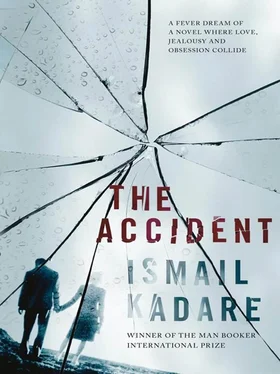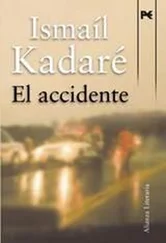“You’re a real star,” said the gypsy woman softly, and her tired eyes and wrinkled face glowed.
That was two months before the December day when the gypsy woman was interned. A purge was under way against vice. Women suspected of loose morals, homosexuals, gamblers and people who encouraged degeneracy were also carted off. Zara belonged to the last category. Criminal investigators in beige suits cropped up on school premises. In panic, Rovena accepted a proposal from a student she barely knew. She thought that this was the best form of safety. I’m not a virgin, she whispered in his ear on the first afternoon when they had gone to bed. He pretended not to hear her.
When the regime fell, she was engaged. Every day, long-forgotten things reappeared out of the mists. Words like “lady”, “miss”, “your grace”, forms of baptism and prayer.
But the word “engagement” was one of those that slipped out of use. “Engaged?” asked her girlfriends at the university, with undisguised amazement. To her, the word seemed like a worn-out garment. She used it less and less, and then not at all.
And now you say that nothing is like it was before, she said to herself. That was true then. Everything changed completely, but now… Oh God, what about now? Was everything now the same?
In fact, her meeting with Besfort at that reception turned her life upside-down even more than the fall of the regime. He was frank in his admiration for her, and invited her to one of those dinners that were so common in the frenetic Tirana of the time.
When they met face to face again, their conversation turned once more to beautiful women. He made it no secret that he was talking about her, and nor did she pretend not to notice it. She had known for a long time that she was beautiful.
Enthralled, I heard him say that beautiful women, as distinct from pretty ones, were very rare. According to him, they were different in every respect. They thought differently, loved differently and even suffered in a way that was absolutely different.
I could not take my eyes away from him, until, after a prolonged stare in my direction, which was not his usual style, he said to me, “You know how to suffer.”
Psychic, I thought. How did he know?
I must have frozen, because he hastened to add, “Does that offend you?”
In fact it had seemed to me a kind of insult, I replied. I was beautiful, and there did not appear to be any reason why I should know suffering. Suffering was for others.
Reading my mind, and doubly psychic, he said that nobody should be ashamed of suffering. Then in a voice that struck me as cold he added that what he had said was intended as flattery, because he was sure there were no beautiful women who did not know how to suffer.
I blushed for what I had said, which now seemed to me idiotic. Attempting to make amends, I added a further idiocy: I did not think that I was that sort of person.
He smiled to himself and shook his head several times, like someone faced with a misunderstanding too radical to be explained.
After a silence, as if suddenly remembering that I was still very young and entirely without experience compared to himself, he added, “I’m sorry, I didn’t mean to offend you.” Then, without the slightest sarcasm, he said that the ability to endure suffering was a gift, especially the high-class suffering of beautiful women.
Grateful for this respite, I smiled at him and said, “Are you encouraging me to suffer?” And, looking him knowingly in the eye, I added, “Perhaps you don’t have to…”
I need no encouragement. I will suffer for you. That’s what I wanted to say, but I lapsed into silence.
He kept his eyes lowered, and I sensed that he had taken these words for what they were: an open declaration of love.
Before we parted, in a relaxed and almost boisterous tone, he said that if I were willing he could take me on a three-day trip to a Central European city. Half in fun and half in earnest, we played for a while with this idea, which would have been lunacy even a short a time ago in Albania, but now, after the fall of communism, was perfectly realistic. As we parted, he looked me in the eye for a long time before saying, “I’m serious. Just don’t say no in a hurry.”
I said nothing. I lowered my eyes in shame, and the night and the whole world misted over.
Two weeks later, what had seemed the most impossible thing in the world became reality.
On that day heavy with mist and rain, the Tirana-Vienna flight seemed barely able to move forward. Rovena felt totally numb… The journey seemed endless… At one point she wanted to leave her seat and sit next to him, so that they would at least be together before they crashed…
That is how she told the story later. But in fact she had been alone on that aircraft – not with Besfort at all. The truth was that during the flight she had longed to be with him so much that her mind had gradually performed the necessary changes, to make credible to herself, and later to others, the altered account of the journey.
Its essence remained unchanged. She was going to meet Besfort Y. in Vienna, and during the flight, as the aircraft lurched, she often imagined herself with her head resting on his shoulder. Next to her sat not Besfort Y. but a woman, an activist in the same NGO where Rovena worked. The truth was that she had not hurried to the Café Europa to collect the ticket from him, and he had not suggested they travel together. On the contrary, she herself, after learning of his business in Brussels, had said that she too was going on a trip, to Vienna. “Really? Vienna?” He often passed through Vienna. They might meet. And so, casually, as if playing a game, they had exchanged phone numbers.
In Vienna, after they arrived at the hotel, her travelling companion’s eyes had widened when she announced quite calmly, “I have a lover here. He’s coming to fetch me in an hour.”
And in front of the woman’s very eyes, quite unconcernedly, she started to apply her make-up.
Chapter Three
The same morning. Rovena again.
She shivered, as if a stranger had entered the room. Then she calmed down. It was no one, and Besfort was still not back. The pressure on her temples told her how tired that pretence of sleep had made her.
He is mad, she thought.
Moving towards the bathroom, she did not know why she had thought this. It was something they said to each other so often that it had come to sound like affection.
Under the jet of the shower, the phrase “nothing is the same as before” glittered like a false diamond. It seemed to hang there, as if rinsed by the water.
She was losing the grip on her thoughts of a few minutes before. They were vague at the edges, and even pretending to be asleep had given everything a certain haziness.
The handle of the shower seemed stuck. She thought of what had happened after she came back from Vienna. She was sure that her body had changed, as if her pallor had been absorbed deep beneath her skin and her small breasts, smoothed by desire, no longer belonged to this world. She had felt sure that they had grown since she had first met him. Her feeling of a miracle having happened was mixed with the anxiety that he would not phone and they would part without him seeing them. She imagined him phoning on one of those March afternoons, and then her hurrying to meet him, quickly undressing. Then his admiration, his asking if she had been taking hormones, and her answer that it was nothing like that. “It is you and you alone.”
Under his incredulous gaze her words would cover every fault line of fear like mist. It is you and you alone. My fear of you. My crazy, inhuman desire to please you. A mute entreaty. A prayer, as if before an altar.
Perhaps he would remain unmoved, not be as thrilled as he should be, and for all his fine words about marble and the divine, he might still seem to be elsewhere.
Читать дальше












